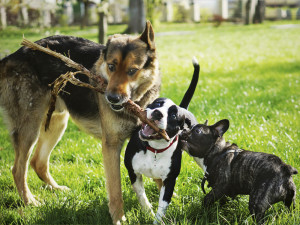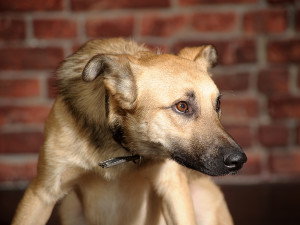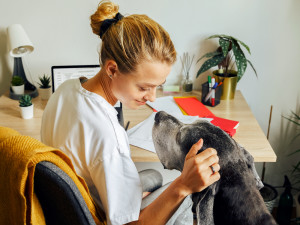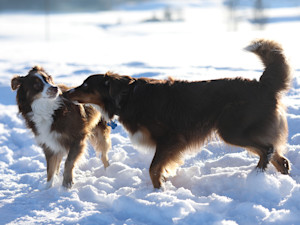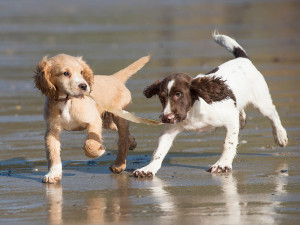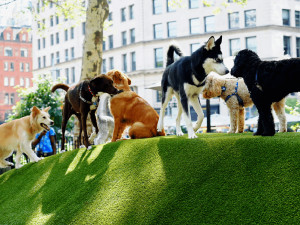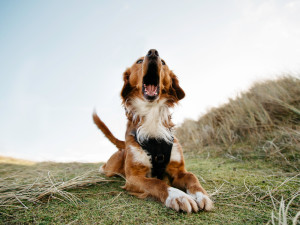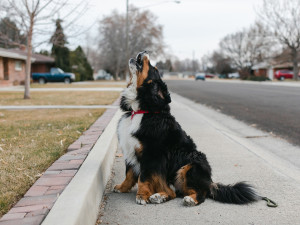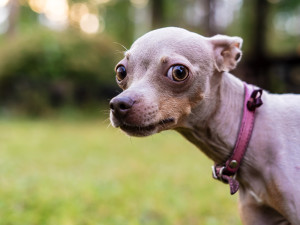Bless Them! Why Do Dogs Sneeze When They Play?
It’s adorable, but there are actual reasons behind this behavior.
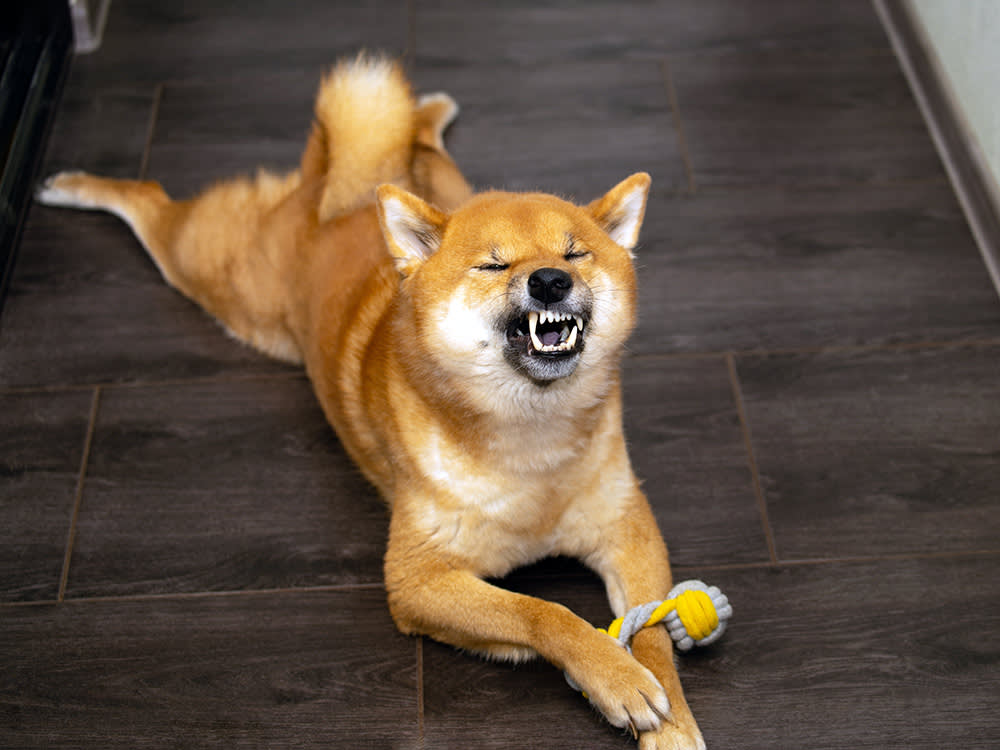
Share Article
You’re watching your dog play with their best buddy, enjoying this balm for the soul, when suddenly, you hear a loud a-choo! It’s your dog, who you definitely don’t think is sick. But for the 100th time, you wonder if your dog really does sneeze during play as a regular thing. Or, are you just noticing it because you pay so much attention to every little thing your dog does in play?
Like so many questions you can ask about dog behavior, a fair answer to whether dogs sneeze when they play is “yes and no.” And, like so many answers to questions about dog behavior, there’s a lot of explanation necessary to make the answer even remotely useful.
In this case, that’s because many dogs do something in play that is not entirely unlike a sneeze. It’s often referred to as a sneeze, even if it’s not the real deal. So, it’s not technically right to call it that, but most people will know what you mean when you talk about sneezes in play.
What is a sneeze, then?
A true dog sneeze, just like a human sneeze, is involuntary. They are the body’s way of clearing stuff out of the nose that should not be in it. When I say “stuff,” I mean dust, pollen, smoke, and other small things that irritate the lining of the nasal cavity.

A sneeze is a rapid expulsion of air through the nose and mouth because of irritation of the inside of the nose. Dogs can sometimes have real sneezes during play because of dust or other gunk being kicked up during play, but sneezing when playing in that way doesn’t make it a play-sneeze. Everybody clear?
What is it if it’s not a sneeze?
The sneeze-like action so frequently observed in play is a bit more like a snort, though it is usually referred to as a sneeze (not quite accurate) or a play-sneeze (better, but still possibly confusing.) The sneezes dogs let out when they are playing often aren’t as explosive as sneezes that are caused by irritants in the dog’s nose.
There’s a lot of variation, but in general, play-sneezes are a bit gentler and based closer to the front of their face rather than involving the entire nose, mouth, and throat. They are generally a bit airier, and fainter in their sound compared with a full-bodied sneeze. They have a more shush-y quality than an explosive one.
So, why are dogs sneezing when they play?
The short answer to why dogs sneeze when they play is that we don’t know because there have not been studies of this behavior. We’re still at the exploratory stage of learning about sneezing during play, which is kind of exciting, really.
I’m all for gathering scientific data, but when it comes to animal behavior, good research so often begins with people observing what animals do, asking questions about it, and trying to figure out what’s going on. They come up with ideas (hypotheses) about what is happening and why, and they keep making observations. For behavior geeks like me, watching animals and seeking to find patterns in their behavior is the height of fun.
I’ve watched dogs sneeze in play for decades and long pondered the purpose and meaning of this behavior. I recently asked some of my certified applied animal behaviorist (CAAB) colleagues about sneezing, and I’m eager to share their thoughts and ideas about play-sneezing in dogs.
Animal behavior experts weigh in on sneezing dogs.
“Sneerting” is another word for it, apparently.
Kristina Spauldingopens in new tab, author of The Stress Factor in Dogs: Unlocking Resiliency and Enhancing Well-Beingopens in new tab) notes, “I have observed sneezing (snort-sneezing? sneerting?) in a couple of other contexts. Both of my dogs used to sneeze during training — specifically obedience/r ally training, which is interesting, since although I believe they really enjoyed it, it seems pretty far removed from play. My current Australian Shepherd will sneeze when greeting people he really likes.”
(I like the term “sneerting” so much I’m using it from now on!)
It’s their way of saying “hello.”
Jody Epstein opens in new tab shares her views on this sneezing behavior: She interprets it as a social solicitation — which may be play or pets/sweet talk (with humans).
“My Terrier mix will sneeze/snort when greeting people he likes. My recently passed Chow mix would sneeze when soliciting play/interaction. He’d stare at me, head down a little, like stalking, and then sneeze to get my attention if I wasn’t looking at him. I’ve seen many client dogs and dogs in play groups sneeze/snort as both initial solicitation as well as throughout play.”
Lillian Ciardelliopens in new tab also has a “sneerting” Aussie: “He sneezes both to me and other dogs during play. It seems to occur when play escalates in intensity. He also sneezes when he bonks into something (not an infrequent occurrence) and shakes his head, but that’s probably more of the reflex version.”
It can also happen during a game of “Bite-y Face.”
Pamela Reidopens in new tab, head of the Behavioral Sciences Team with the ASPCA, has noticed a link between a specific type of play and this sneezing behavior, “At least with my dogs, the snorting/sneezing stuff tends to happen most often when they are playing bite-y face [play involving playful bites to each other’s head and neck]. They pull their lips back to expose their teeth, thereby scrunching up their noses,” suggesting that perhaps the type of play is responsible, at least in part, for physically causing the sneezing.
And it can mean they want to stop playing.
Suzanne Hettsopens in new tab, author of 12 Terrible Dog Training Mistakes Owners Make That Ruin Their Dog's Behavior...And How To Avoid Themopens in new tab) has observed a slightly different situation, still involving play, in which dogs sneeze.
“I’ve seen the sneezing when it seems one or both dogs are wanting to end a play session — the one who is done sneezes/snorts, if the other one agrees s/he returns the snort and the play bout ends,” she says. “If she/he wants to continue playing she doesn’t sneeze and then shows a play behavior.”
Hetts’s observations indicate that sneezing can be a form of deliberate communication between dogs and also a way that a dog seeks to communicate with people about what they want: “I’ve also seen it when one of my dogs would come up and bark or paw or just stare at me, clearly wanting something (outside, play, attention, a walk, whatever), and I’d say something like, ‘Not right now’ or ‘Just wait a minute,’ which would be followed by a snort/sneeze.”
Other animal species sneeze even when their noses aren’t irritated.
Dogs aren’t the only animals who sneeze in situations, other than clearing something from their noses. One example of sneezes as a form of communication comes from African wild dogs. Scientists have observed them wander around an area where the pack has been resting. After this period of milling around, sometimes they leave to go on a hunt, and sometimes they go back to chilling out and resting.
Researchers interested in the decision-making process of the group made an astonishing discovery: African wild dogs sneeze to vote about what they should do. A sneeze is a vote to get a move on and start hunting. If the pack has enough dogs in it who sneeze, they will move, and if there are not too many sneezes, the pack of dogs stays put. Horses also sneeze for reasons beyond having dust up their noses (though they do that, too!)
Sue McDonnellopens in new tab, a professor at Havemeyer Equine Behavior Labopens in new tab of Penn Vet, University of Pennsylvania, explains: “In horses, there is what seems to be an analogous ‘soft longish snort-snuffle-like’ forceful exhalation associated with the resolution phase of a burst of high-level excitement, whether positive or negative … So, in horses these sounds occur in a lot of situations ... [including] during play bouts after a burst of intense action rolls into more quiet play, as an inter-male aggressive encounter quiets, after an acute painful moment, and even during training.”
There are so many ideas about play-sneezing.
A lot of dog behavior experts, as well as expert dog lovers and parents, have observed play-sneezes and come up with ideas about what might be going on. The topic absolutely begs for proper research.
There are many possibilities that require scientific study to sort out, and it’s very likely that more than one of these ideas are true. Different dogs may sneeze for different reasons and in different situations.
For now, some of the main theories are that dogs sneeze:
Due to excitement during play or in greetings
Because of high-arousal situations in general
To indicate they want some kind of interaction
To communicate whether or not they want to continue playing
To encourage others to calm down
Because of physical contact with their nose
When you watch your dogs play, do they sneeze? And if so, what do you think this sneezing is all about?

Karen B. London, PhD, CAAB, CPDT-KA
Karen B. London is a certified applied animal behaviorist (CAAB) and certified professional dog trainer (CPDT) who specializes in working with dogs with serious behavioral issues, including aggression. She has written for a variety of magazines including The Bark, Clean Run, and the APDT Chronicle of the Dog, and has published in scientific journals including Behavioral Ecology and Sociobiology, Ethology, Ecology, and Evolution, the Journal of Insect Behavior, and Insectes Sociaux. She is the author of seven books about dog training and canine behavior, including the forthcoming My Dog's Mystery Adventure: And Other Stories From a Canine Behaviorist and Dog Trainer.
Related articles
![two small puppies play on a beach]()
Here’s Why You Need to Socialize Your Dog ASAP
Waiting until full vaccination to socialize can cause huge problems for your pup.
![dogs at dog park drinking water and playing in pool]()
Dog Park Etiquette: Dog Park Dos and Don’ts
New kid on the block? Follow this trainer’s tips before letting your pet run wild.
![Dog Lays On The Ground Barking]()
Dog Speak: The Sounds of Dogs
Decoding the many sounds your pup makes.
We Answer the Age-Old Question: Why Do Dogs Howl?
How to help a howling dog turn down the volume (or even hit the off button).
![Russian Toy Terrier with ears back]()
9 Reasons Why Dogs Put Their Ears Back
Here’s how your dog’s ears can clue you in to how they’re feeling.
![Australian shephard and Corgi mix play fighting outside]()
How to Recognize the Signs of Dog Aggression
A PSA to pay better attention to our best friends’ body language.
